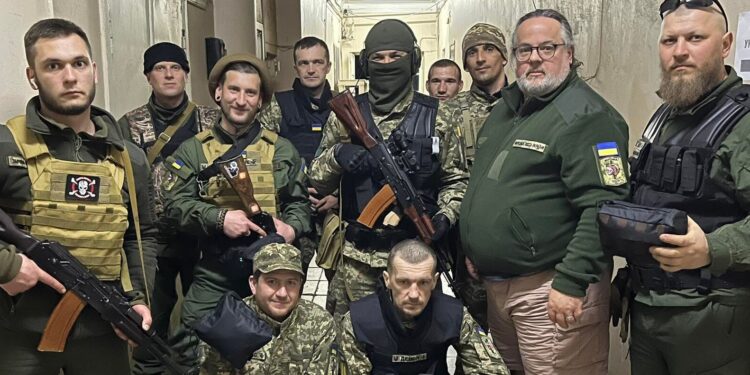by Miceál O’Hurley
REPORTING LIVE FROM INSIDE UKRAINE — Earlier this week I arrived late at night to meet-up with the SHTURM Special Purpose Marine Battalion. I will be embedded with this unit for part of my duration in Ukraine. The location of the battalion is being withheld according to Press Guidelines to ensure their security. SHTURM transliterates from Ukrainian ukr Штурм as ‘assault‘ or ‘attack‘.
Despite claims by Moscow they have withdrawn from the North of Ukraine attacks across the country continue. Kharkiv is shelled constantly and Kyiv comes under attack daily. As with most things, the Russian narrative about about a strategic redeployment is only half true at best. After touring battlefields and coming under fire several times this week it is clear that the Russians did not withdraw as they claim. They they were driven out by Ukraine’s armed forces. The haste by which the Russians left throughout the Kyiv region are indicative of a retreat not a redeployment. Significant amounts of intelligence were abandoned in haste, and vehicles were destroyed by their own forces to keep them from being captured by Ukraine. All evidence is that the redeployment was a necessity as the Ukrainian military, many of whom took up arms to defend their nation only weeks ago, fought the Russians to a standstill necessitating their hasty retreat.
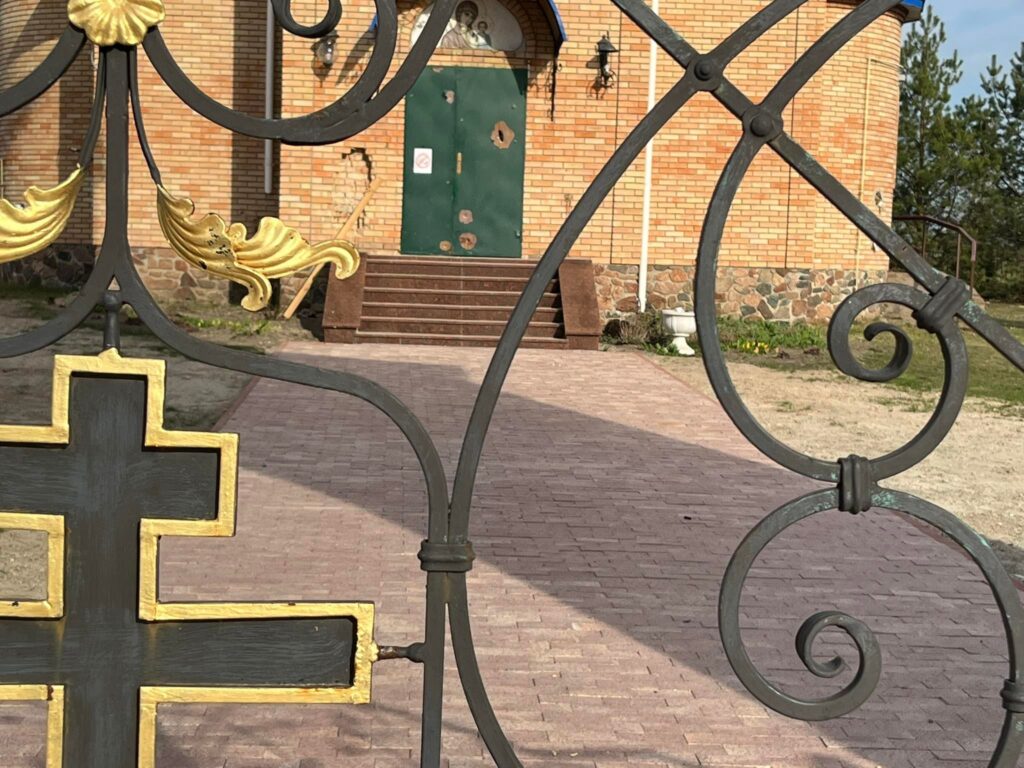
There is every indication that the particularly brutal and heinous war crimes perpetrated by Russian forces against the civilian populations that had temporarily fallen under their control were driven as much by their anger at being defeated by a Ukrainian army and people they were told were inferior as it was by their policy to visit specific punishment upon the civilian population as part of Moscow’s overall plan of action. Indeed, myriad incidents of war crime are far too widespread and enduring to be explained away by Moscow or to be eventually excused by them as the errant acts of rogue units. The breadth of the war crimes marked by rape, torture, murder and summary execution of Ukrainians, including children make a compelling case for them happening under order and not being random exceptions. I wish, for the sake of the Ukrainians I have met that these were exceptional events but that would be a lie. This type of wanton rapine pillage and violation of women, including gang-rape of even elderly Ukrainian women has become all too commonplace.
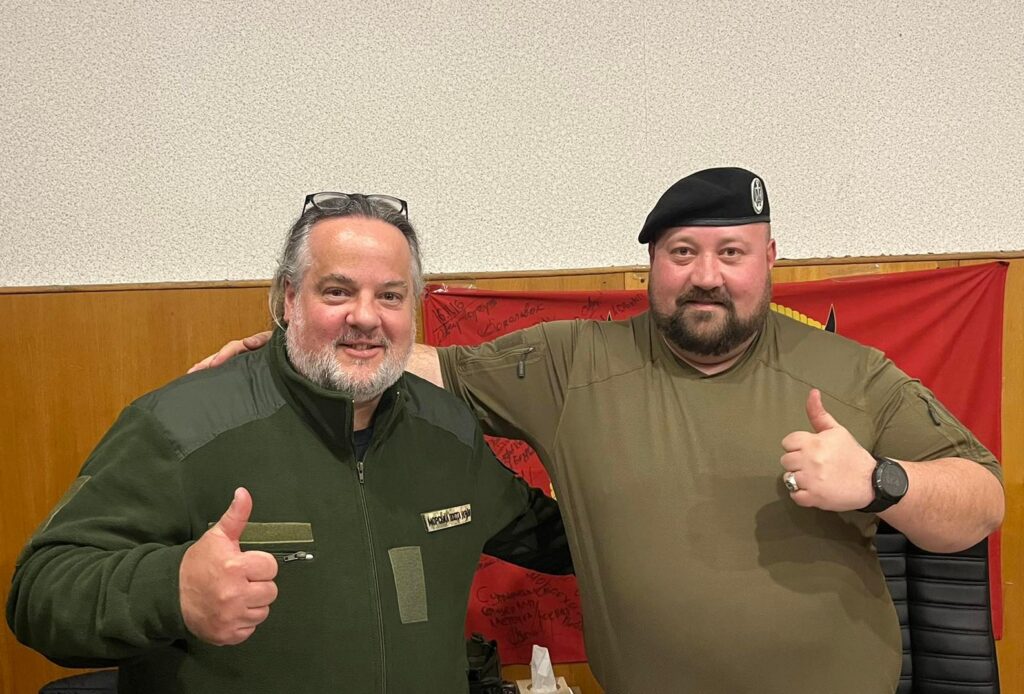
The SHTURM Special Purpose Marine Battalion is an elite, all-volunteer, special operations unit of the highest caliber. They would find their place amongst the Rangers, Special Forces or Seal Teams and their international equivalents. Formed by necessity on 24 February, Ukraine’s military command looked to an experienced combat veteran to lead this elite battalion of Marines. The commander, Yurii Mykulyak, might be confused for an average Ukrainian thrilled with becoming a happy grandfather of a new grandchild over which he dotes. Yet behind this gentle exterior I found the heart and soul of a warrior. He didn’t need to sit in the commander’s chair at the head of the table to be recognised as the battalion’s leader. He exudes confidence, cunning and daring – the triple threat of a field combatant. In his youth Mykulyak was decorated for exceptional heroism in combat for having saved his unit. Cut-off behind enemy lines he kept his men on the move for days, without food, sleep or water. His sheer leadership and determination coupled with his tactical knowledge, awareness of terrain and in-depth knowledge of each of his men allowed him to fight their way back to safety under his command in the most trying of circumstances. Mykulyak is a man who knows the horror of war and has demonstrated his skills and leadership under fire. And yet he emerges as a renaissance man – highly educated, intelligent, humble and focused not only the martial life he has led but on Ukraine’s culture, her people and even her history and literature. He is modernity’s answer to the leaders of old and the Marines who serve under him count themselves fortunate to do so.
I entered the SHTURM Marines temporary headquarters by passing through several alert sentries. It is an old, ramshackle building unfit for use but for Marines used to fighting in the snow and rains of Ukraine’s springtime, where temperatures vary from sub-zero to hot and back again in a single day it was regarded as paradise. My credentials were checked repeatedly. Using radios that appear to have been purchased ‘off the shelf’’ they cleared me each step of the way with attention to detail that demonstrated they took the threat seriously. I was asked repeatedly to ensure my geolocation was switched-off on my phone and reminded not to photograph anything with a background that would betray their location or intelligence on desks or walls, especially maps. I was finally allowed to enter the building where the SHTURM made their temporary headquarters only to be confronted by a makeshift barrier made of sanbags with a machine gun trained on the door. These Marines took no chances and their preparation was not unreasonable. They were disciplined and highly trained. One would be not mistaken to believe that they were career military personnel, but that is simply not the case.
The senior officers of the SHTURM were hand-picked by Mykulyak. Together with a cadre of non-commissioned officers and troops they formed a small but experienced band of veterans of the now 8-year long war defending their homeland against Russian aggression. These veterans had acquired significant experience in Donbas. Unsurprisingly, they were immediately thrown into the fray as Russian forces began to stream across the Russian and Belarusian borders in the first days of the current escalation of this long, bloody war. Owing to Mykulyak’s leadership and the skills, and discipline of the women and men under his command, the SHTURM distinguished themselves on the battlefield immediately. I was given a very privileged tour of their encampment in which camouflage netting was pulled back so I could inspect several Russian vehicles the SHTRUM Marines had captured. They were re-purposing them for their own use by making repairs to the damage they themselves had inflicted and painting over the Russian Federation flags with the yellow and blue of the now famous Ukrainian flag. Civilian volunteers who were auto-body repairers by day were carefully spray painting vehicles in black or camouflaged as vehicles were prepared for their new duty. These included armoured vehicles, fuel trucks and command vehicles. Not doubt Russia will soon regret not having put their vehicles beyond use upon capture or fleeing. The SHTURM Marines mean to use them and there was every sign they know how.
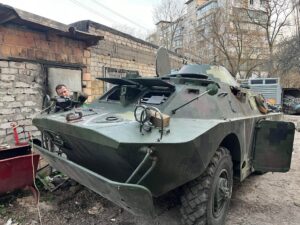
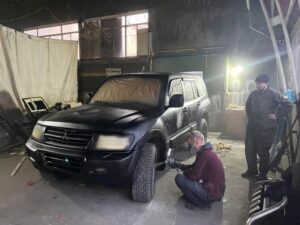

Despite the late hour, I was honoured to be invited to meet with the senior officers and non-commissioned officers of the SHTURM Battalion. Being myself a combat veteran and having covered wars for the past 40-years, I was immediately received as a peer. It was apparent to me that I was amongst sisters and brothers who had yet to realise the extent of their heroism and given my age and condition I felt unworthy to sit in their company. I call them heroes advisedly and knowingly. These Marines were the ‘real deal’. Heroism, they have learned, is not the abundance of confidence in doing one’s duty. Heroism is the knowledge that unbridled and reasonable fear wells up in each of us and overcoming it to do what is necessary. Those around the table didn’t feel a need to tell me they had been heroic. In fact, they would have denied it. However, their achievements on the battlefield only days before, having driven the second largest army in the world from the battlefield having suffered unimaginable losses was evidence they deserve to be honoured for their bravery. And this needs to be said – there is a tendency to play down the quality of Russian weapons, tanks and equipment because it suits a certain narrative. Don’t be taken in by this. Russia has the equipment and ability to win, even if they failed to do so to date. True, this reflects poorly on there Generals Staff and command. But make no mistake – a Russian rifle is deadly instrument. Their tanks are fearsome machines and their missiles are deadly. Daily news reports make that visually and abundantly clear. The Ukrainian armed forces, the SHTURM Marines included, won because of their skill, dedication, training and leadership but the threat remains. This war is long from over given today’s metrics.
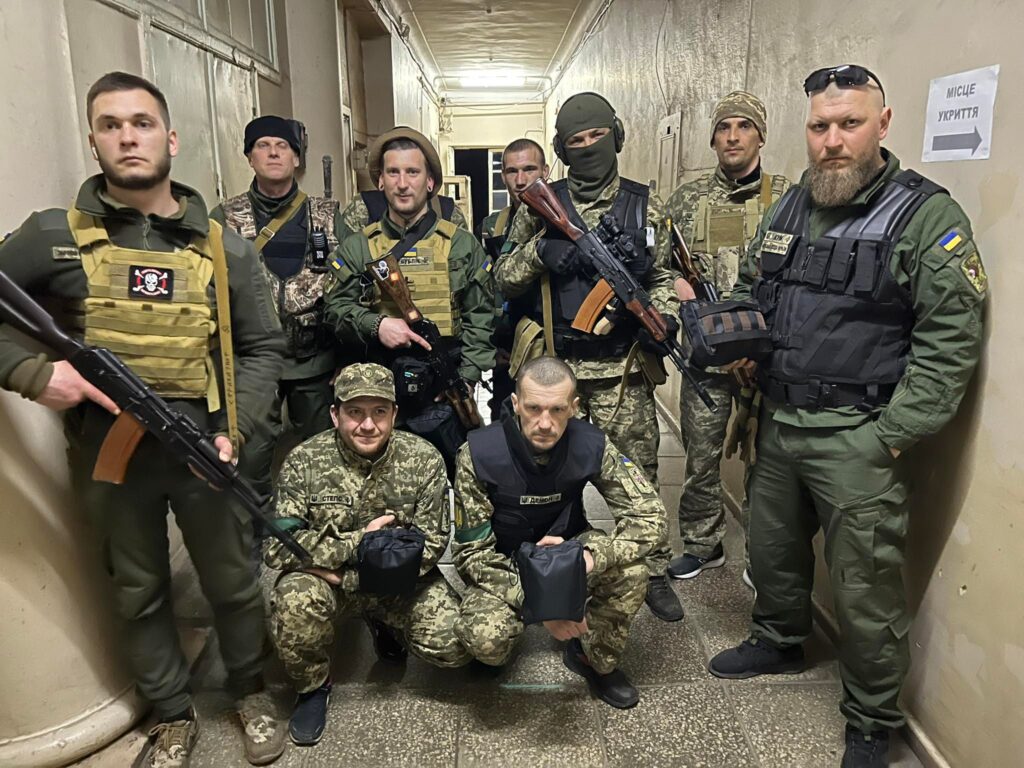
Consequently, there was at all times in these Marines a dynamic dichotomy. They clearly understood the seriousness of the battles they had fought so recently and those they were preparing to undertake. They knew the risks. They had seen their share of death and destruction. Still, they spoke of their families, their occupations and their friends, not with the sigh of longing but with an exuberance of expectations for the future. This full-throated embrace of life only comes from those whom have faced death in combat and survived it. It is hard to explain but is something immediately and genuinely shared without words by those who have been to war. Experience tells us that many of these veterans will remain buoyed by this experience for life. It may drive them to new heights. For others, it will be an albatross around their neck. They will suffer, sometimes silently, for the rest of their lives. So will the people around them that love them. Already they know this and are nonetheless willing to risk all, even a life-long sentence of being haunted in their dreams and in daily life, all for the cause of freedom.
I was invited to ask Mykulyak about his battalion and nothing was off-limits as I agreed only to print what would not compromise personnel or equipment. When I asked about how his battalion grew so quickly from a handful of hardened veterans on the first day of the war to become a full-strength battalion he answered plainly, “We are fighting for our survival. Men who had been postmen on the 23rd picked-up an anti-aircraft launcher and brought down a Russian fighter aircraft. Women who had been paramedics became experienced combat medics overnight saving lives caused by wounds only skilled surgeons would confront in peace. We fight for our survival and that of Europe,” he said. “Because we did our duty to the best of our ability, we don’t have to advertise or set up recruiting stations,” he continued. “Women and men seek us out and I’m proud of the quality of people who volunteer. Doctors, lawyers, bricklayers, mechanics, paramedics, businesspeople – they want to be SHTURM Marines and it is my deep honour to command them,” Mykulyak said. “We take our responsibility to both Ukraine and our Marine’s families seriously. We will die if needed but it is my plan to win, free every centimeter of Ukraine from Russian forces and see every woman and man that joined the SHTURM Marines return home safely to their families and friends. We have a country to rebuild”. Mykulyak, as can been seen, is a man of vision as are his people.
Deprived of any training, the new volunteers received their baptism of fire in lieu of any training whatsoever. Despite intense close fighting that went on day-after-day for over a month, the SHTURM Marines experienced only 2 casualties on the injured list. It is unimaginable how they survived. As the night wore on it became clear – Mykulyak and his officers were professionals who would drive their marines to the brink if necessary but knew when to pull-back and when to rest. These are the traits of effective leaders – knowing the limits of their personnel, the extent of their resources and understanding who to combine them for maximum effect at the right moment.
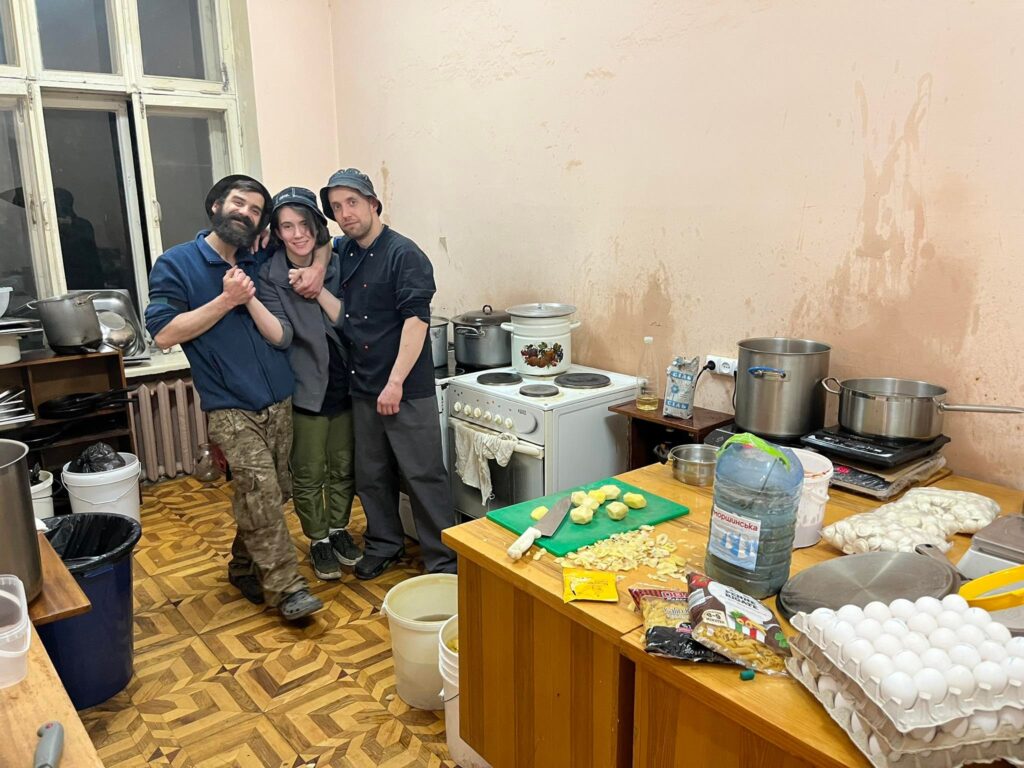
After our meeting I was taken to the Battalion mess where three chefs prepared a meal of pelmeni for me. A traditional Ukrainian dumpling, it was to me like a 5-star meal. It was my first meal in days. I’ve taken to referring to the battalion chef as “Klopotenko” as an homage. My friend Evgeny Klopotenko, the internationally famous Ukrainian chef, a graduate of Le Cordon Bleu in Paris whom has been a guest on ‘In Conversation This Week with Miceál O’Hurley’ to discuss his campaign to have UNESCO recognise Borsch as an authentic Ukrainian heritage and cultural item. In all truth, the three battalion chefs play an incredibly important role in morale and fitness by preparing appropriate meals for fighting women and men. They sleep fitfully as there are Marines on duty around the clock and meals never stop. Even in their makeshift mess hall, the chefs have decorated the room with artwork drawn by small children in crayon or finger paints, each praising the SHTURM Marines and encouraging them. These decorations have the desired effect. Marines visit the wall of children’s artwork as though they were visiting the national gallery before returning for duty. In Ukraine, even the children play their important part in this war.
The next morning I continued my interview of the Marines and observed their training. One thing impressed me more than all others – the majority of those now serving in the SHTURM Marines were not veterans before this February. They are not paid, even provide their own uniforms and serve for no other reason than they believe in the future of Ukraine and its place at the centre of Europe. Getting to know them I see in them the Spartans of Thermopylae who left their families in a sacrifice that would see the emergence of a unified Greece. I could easily imagine them ‘Minutemen,’ American farm boys who would respond within a minute’s notice and who as volunteers formed the core of the Continental Army that fought under the likes of George Washington, Henry ‘Light Horse’ Lee, Casimir Pulaski and the Marquis de Lafayette. And of course, I saw in these Ukrainian volunteers in the SHTURM Marines Special Purpose Battalion the reflection of the youth who fought under Charlie Hurley, Tom Barry and Michael Collins in Ireland’s War of Independence defeating what too was then the second largest army in the world. The truth is, most of these Marines were typical Ukrainians only 6-weeks ago. They had never held a rifle before, let alone fired one under pressure. Ukrainians are especially known as a martial people. But as the world has seen, they will fight for their survival if necessary as did those I mentioned before.
One might think a unit that distinguished itself as bravely as did the SHTURM Marines would find respite, rest and relaxation in the rear during this relative lull while Russia redeploys for the expected offensive in the East and South. Not the SHTURM Marines. They have committed themselves to daily training. Each occupation within the SHTURM Battalion is honing its skills. From communications to combat medics and from riflemen and snipers to chefs and administrators, each is preparing for what may come. They are not idle and are diligent in every detail. This is a product of esprit de corps found only in the most highly developed units around the globe. How Mykulyak and his officers achieved this sense of cohesion during active combat and in under 6-weeks could serve as a doctoral dissertation study for a War College candidate. Bets are their conclusion would be as mine – it comes down to leadership.
Even during the break between breakfast and first formation Marines gathered in 3-person teams practicing to move in concert to clear a room in an urban combat setting. The grace by which they move their rifles to ensure they cover ever angle of the imaginary room they practice on assaulting while not once putting their comrades at risk of accidental misfire creates the appearance of a ballet. The movements are gentle, graceful and yet deliberate and meaningful – so rehearsed it would be adjudged art if it weren’t the deadly work of assaulting an urban building. Medics were sorting their kits uniformly so they could put their hand into any bag without looking and find scissors, a tourniquet or bandage without distracting their attention from a wounded Marine. Even the cooks are planning ahead, determining how to prepare meals for an entire battalion on one makeshift cooker or observing health standards to ensure their kitchen would pass any health and safety inspection. Nothing escapes criticism, refinement and consideration. They are without guile and have only commitment.

Albeit, even this is a respite from all that preceded this short interim period of relative calm does not occur in safety. As we waited for the morning announcements two days ago a missile strike took place just to the East of us as air raid sirens wailed. Then there is the clearing of debris and assistance being given in Bucha where two of the female medics are treating the wounded and dealing with the dead who are daily being discovered in the rubble. Upon photographing what appeared to be an abandoned crate of Molotov Cocktails I discovered a trip-wire linked to a Russian Grenade hidden in the crate amongst the bottles. Stepping out of my role as a combat journalist and resuming my own combat experience from 40-years ago as a young Airborne Ranger, I disabled the tripwire. Not a usual experience for a journalist in the field, even during times of war. Had it gone off the shrapnel from the grenade would have killed anyone in proximity and the petrol in the Moltov Cocktails would have inflicted gruesome and deadly burns upon the unsuspecting. Left by Russians as they retreated from Bucha this booby-trap was meant to be deadly. We marked the crate with yellow tape and posted a guard to ensure no children or civilians would be maimed or killed. It was a close call but one I will be clear of in a few days.
The SHTURM Marines and Ukrainian civilians alike, however, will have to live with bobby-traps and unspent Russian ordinance for years to come. Even in cities now cleared of Russian troops, their deadly explosive devices hidden under children’s toys, bicycles, under bodies and other secreted places are discovered by the hour. The gravitas of the situation is lost on no one. And far from instilling a sense of exhaustion or defeat upon the Ukrainian people, these cruel and crude booby-trap devices left in civilian areas to kill the innocent represent yet another misjudgment by Russia and Putin. Their very existence gives Ukrainians yet more reasons to fight and bring this conflict to a decisive end in victory.
Russia’s war on Ukraine is decidedly different than any that has come before it during possibly the last 30-years. Ukraine was not involved in attempting to destabilise Russia. There was no insurgency launched on Russian territory that could possible constitute a cassis belli. There was an absence of religious turmoil, economic attacks, political interference by Ukrainians in Russian domestic politics. There was only the desire of Ukrainian to determine their own destiny and return to their rightful and historic place at the centre of Europe. Of course this did not suit Vladimir Putin and the Kremlin whom had been actively undermining form Soviet Bloc or Warsaw Pact countries for years, all with a design to subjugate them again in the new Russian Empire Putin announced time and again he desired to build. Unlike the wars in Iraq, Afghanistan, again in Iraq and even Syria, this was a war without cause except for Russia’s voracious appetite to rule over others for their personal benefit. Possible for this very reason the entirety of Ukrainian society has opted-in voluntarily for the defense of their homeland.
The women and men leading and serving in the SHTURM Special Purpose Marine Battalion understand are the products of that self-mobilisation. They known exactly why they are fighting and believe their cause is just. It is. Whatever their background as professionals or laypeople they volunteer to serve, without pay or benefits, and this commitment is driven by their surprisingly articulate ability to explaining the complex and advanced reasons that underlie why and for what they are fighting. One would be forgiven for thinking they were regurgitating wrote information spoon-fed to them in training. Yet the absence of repetitious phrases and patent ideology is wholly absent from their vocabulary. There are no slogans or propaganda being spewed for the benefit of the masses. Each Marine makes their case in their own words, filled with a sense of conviction I have rarely witnessed in my 40-years as a soldier and then as a journalist covering 6-wars. There is a genuine belief their sacrifices are an existential matter. If Russia were to stop fighting this 8-year long war would end immediately. Yet if Ukraine were to stop, or lose, Ukraine would cease to exist. This is not just rhetoric, evidence for abounds.
Early this morning word reached us that Ukraine rejected Russian demands that the troops fighting in Mariupol surrender by sun-up. Given the atrocities committed by Russian soldiers against Ukrainian military personnel and civilians alike in places like Kharkiv, Bucha, Irpin, Sumy and Chernahiv amongst others, as well as the horrors that predated the latest round of Russian brutality that began in 2014 in places like Slavyansk and Kramatorsk, Russian cruelty and disregard for human rights has only reinforced the plethora of empirical evidence that Ukraine has no option but to fight and prevail or perish. The choices are both that stark and limited. Europe must understand this.
What is striking in listening to the Marines is that their motivation to fight is not confined parochially to Ukraine. Without question, they fight for their families, their homes, their friends and their country. They fight because of the multitudinous outrages they have personally confronted on the battlefield or witnessed in places like Bucha. This is the usual byproduct of war. Still, to hear each Marine articulate in their own way their steadfast belief they are fighting to preserve Europe, its values and principles is astonishing.
This is the same Europe that held-off Ukraine’s membership ambitions in NATO and the European Union for years using rhetoric and platitudes to hide the limitations imposed by Europe’s ‘Proximity Policy’. Yet each Ukrainian knows they belong at the heart of European civilisation where Ukrainian history has been rooted for over a millennia. Ukrainians know their history and it is that which has preserved them during long-periods of occupation and misery. Ukraine existed and enjoyed diplomatic relations with the Byzantine Empire before most European nations were even a concept or idea. Ukrainians are aware of their history and its iconic characters in the same way most nations carry on their tradition of identity. What is unique, however, is Ukraine’s identity has tended towards universality and not simply geographic confines. In many ways Ukrainians have been a mother, sister, brother or cousin to every European and regional country. Consider that when Yaraslov the Wise gave his daughters in marriage in the 11th century they became the Queen Consorts of Europe’s greatest houses. What more could convincingly demonstrate Ukraine’s historic roots and gift of culture to neighbouring European nations? Of Yaraslov’s daughters, Elisiv became the Queen of Norway. Anastasia was elevated to be the Queen of Hungary. And Anna, who married the Dauphin, became Queen of the Franks at times ruling in his place as Regent when he was off to war. Indeed, when Anna came to the French court as a young bride she was the only member of the entire French court that was literate and in 5-languages no less. A visit to the Elysee Palace and Louvre will prove her influence on France as a driver of its culture, literature, piety and poetry.
Ukrainians understand the absurdity of assertions that before Ukraine is fit join the European Union it must learn European values. This was self-serving rhetoric based in ignorance. It is well understood that many of those much-vaunted values, including its Western traditions, faith, education of both women and men, rights of equality, the rule of law and more were part of Ukrainian life and culture that were proclaimed and celebrated from golden domed Cathedrals extant in Kyiv for over 1,000-years. These marvels of architecture, replete with frescoes and fine artworks, were completed when many European capitals were constructed with mud bricks and wood. It is not surprising therefore that this contextualisation of history and culture makes Ukrainians highly protective of Europe. And it demonstrates why they see their place at the heart of Europe and its future, even if the current political institutions have tarried in bringing them back into the fold after suffering Russian colonialism and the evils of communism in their recent past.
The SHTURM Marines with whom I am embedded are wholly unified in their belief that given their demonstrated prowess on the battlefield they can defeat the Russian onslaught as they have shown the world these past 6-weeks. With the right tools in their hands they have proven repeatedly they can not only defend Ukraine but put an end to Putin’s territorial ambitions in Europe. This is no mere boast. Not since the Viet Cong armed with relative ‘sticks and stones’ defeated first the French and then American forces equipped with superior, advanced weapon systems and much larger armies has a military done so much with so little. The achievements of the Ukrainian armed forces has surpassed all expectations. There are numerous European leaders who publicly cheered on Ukraine at the outset of February’s Russian offensive only to tell her diplomats privately they expected Kyiv to fall within days. The United States famously offered President Volodomyr Zelenskii a flight to safety in witness of their doubts about Ukraine’s future. Zelenskii’s retort that he needed weapons, not a ride was not a trite response – it came from the heart. It was repeated many times in many ways across Ukraine even in the now equally famous retort to the Ukrainian troops defending Snake Island against the flagship and pride of the Russian Navy, the Moskva. Look where Ukraine is today and think of the resting place of the Moskva.
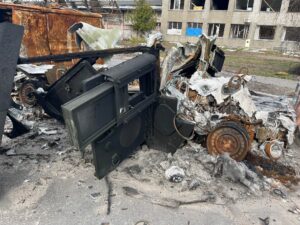
Like their comrades, the SHTURM Marines only ask one thing of the West, “Give us the tools to win so you won’t have to suffer and fight yourselves“. If history provides any lesson, this seems like a good and prudent offer for the West. At the outset of World War II, the United States declined to rebuild its army. As a matter of half-measures, it created the ‘Lend Lease‘ programme to help its allied defend themselves against the Axis powers. This was folly. Eventually, Japan attacked Pearl Harbor and German U-Boats killed Americans at sea. Had America acted earlier how much of Europe would have been spared their devastation of that war? How many Jews would have survived a shortened war? What pieces of history, art and culture lost to the tons of bombs dropped on European cities or looted by Russia and the Nazis would still survive today had American responded robustly at the beginning of that sorrowful period of history?
Ukraine is offering the West the chance to end this was early and decisively. Europe should recall the history of World War II and commit fully to helping Ukraine win and thereby save itself from another half-century of turmoil, division and recrimination. Most of all, Europe can redeem itself from sleepwalking into an economic relationship with Russia that still funds the destruction of Ukraine and is killing its civilians daily.
European leaders would be remiss if they did not learn the lessons taught by The Bard. Shakespeare recounted how before the Battle of Agincourt the young Henry V clothed himself in ordinary cloth and visited the campfires of the troops incognito. There he heard their moans and groans as well as their hopes and ambitions. It would behoove world leaders to do the same today. They would hear the Ukrainians ask, “Will Paris have to be turned into another Bucha before the French give us the weapons we need? Or maybe Berlin should be asked to give the East of Germany to the Russians before they realise what is at stake”? Hearing the genuine concern that it would be senseless to allow such misery to befall their fellow Europeans would move any true European leader to give Ukraine the game-changing tools they need to win.
And if they listened to these incredibly brave and committed SHTURM Marines the central question would come sharply into focus, “How many Ukrainian children must die, lose limbs, be blinded, or our women raped and civilians executed with their hands bound behind their backs before their lives have value enough for Europe to act? Do they not realise that if we do not win, Putin will do this again and again to our neighbours in the Baltics, to Slovakia, Slovenia, the Czechs, Moldova or France or Germany? This is not talk, it is a real question”!
To date, Europe has largely avoided these hard truths and instead focused on the question of aid they are giving. The rest of the West needs to join their Baltic neighbours and countries like Slovakia who are effectively equipping and arming Ukraine. Overall, the question needs to shift from explaining why weapons can’t be provided to defending the feebleness of such policies that allow Ukrainians to suffer for no reason than a lack of will from the West. Any honest assessment of an attempt to defend such policies to the SHTURM Marines, Ukrainian forces and civilians would prove an exercise in moral bankruptcy.
Europe’s avoidance of confronting its failures that have subsidised Russia despite 22-year of aggression across Moldova, Georgia, Ukraine, Syria and on mainland Europe by means of torture, murder, cyber crimes and political interference is indefensible. The Eurocentric idea that Russia could ever have been a reliable partner is severely undermined by all evidence their guarantees from the Bucharest Memorandum to their pledges to abide by the Geneva Conventions. After these last 8-years and the exposure of the inhumane war crimes inflicted on the innocent of Irpin, Kharkiv and Bucha, is there any point in pretending Russia could prove a durable partner in anything? Any belief Russia can be relied upon to abide by the law or act in a civilised manner must be dispensed with. In any event. the desire of diplomats and business people to be photographed doing business with the same Russian leaders who were the authors of such heinous crimes must be few. Europe only has one path reasonably available to them for their redemption and security – help Ukraine win.
The time is ripe for European leaders to join the cause. History has an alacrity of preserving names and keeping a ledger on which side of good their names are recorded and remembered. Will they be a Quisling or a Willie Brand? This is the question that will haunt their consciences and souls. Posterity tends to have that effect. They may want to ensure they end-up on the right side of history and be counted amongst Ukraine’s ‘Band of Brothers‘ and not remain accursed gentlemen who remained in their beds at the hour of decisiveness.
The SHTURM Special Purpose Marine Battalion and all of Ukraine is inviting Europe to join them in being fit to personally celebrate Saint Crispin Crispian’s Day with them by heeding the words of Henry V of England:
He that shall live this day, and see old age, Will yearly on the vigil feast his neighbours, And say "To-morrow is Saint Crispian." Then will he strip his sleeve and show his scars, And say "These wounds I had on Crispin's day." Old men forget; yet all shall be forgot, But he'll remember, with advantages, What feats he did that day. Then shall our names, Familiar in his mouth as household words— Harry the King, Bedford and Exeter, Warwick and Talbot, Salisbury and Gloucester— Be in their flowing cups freshly rememb'red. This story shall the good man teach his son; And Crispin Crispian shall ne'er go by, From this day to the ending of the world, But we in it shall be rememberèd— We few, we happy few, we band of brothers; For he to-day that sheds his blood with me Shall be my brother; be he ne'er so vile, This day shall gentle his condition; And gentlemen in England now a-bed Shall think themselves accurs'd they were not here, And hold their manhoods cheap whiles any speaks That fought with us upon Saint Crispin's day.
Every day in Ukraine is Saint Crispin’s day. It is still not too late for Europe to fight on the side of good, democracy and freedom to preserve the European way of life and Western civilisation in so doing.
































